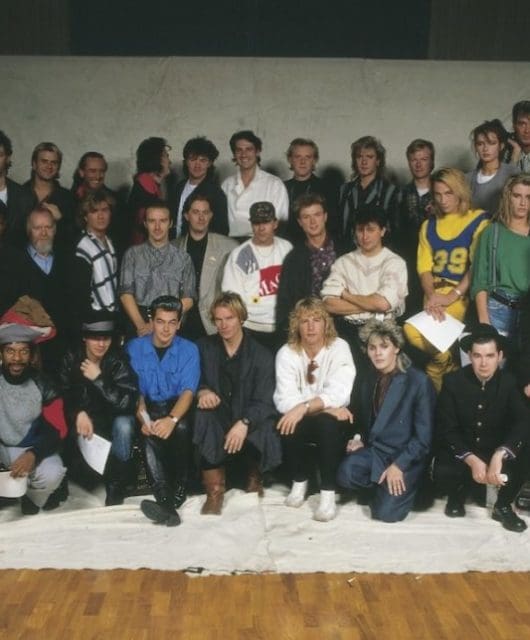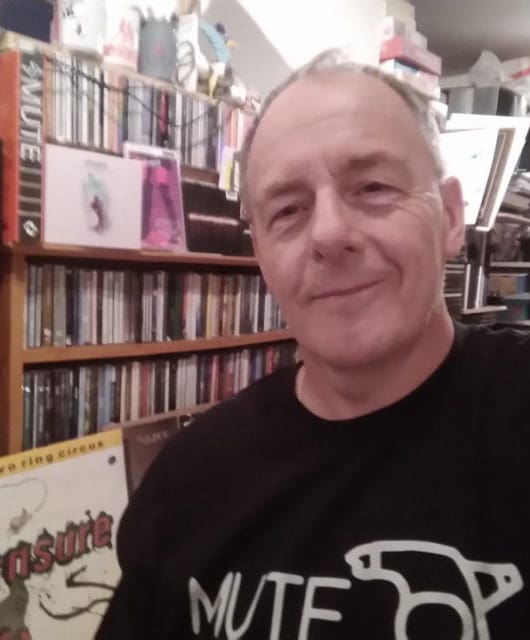Classic Album: Happy Mondays – Pills ‘N’ Thrills And Bellyaches
By Felix Rowe | February 4, 2025
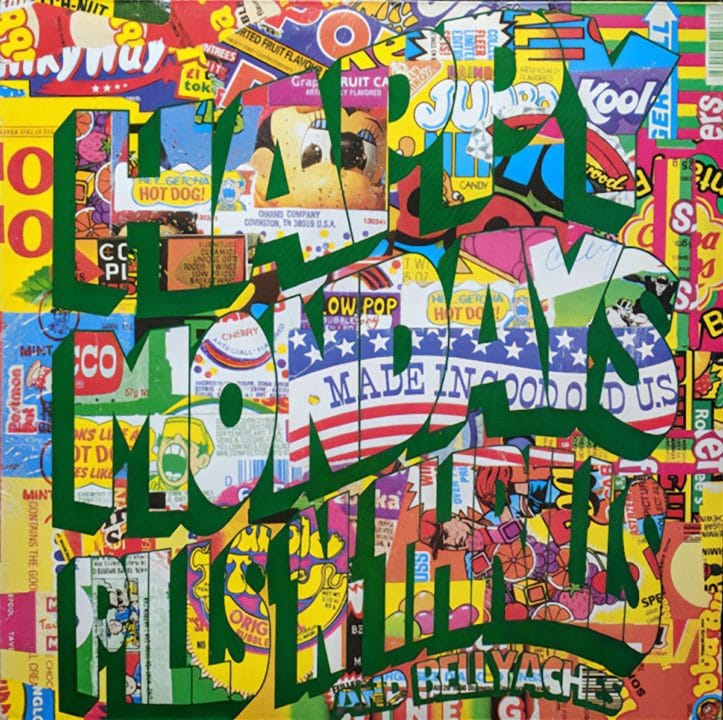
The Happy Mondays’ Pills ’N’ Thrills And Bellyaches elevated Shaun Ryder and Co to leaders of the Madchester wave in the early 1990s and it is still twisting our melons today… Call The Cops!
The turn of the 90s. What a time to be young. The explosion of rave culture culminated in 1988’s Second Summer of Love. The marriage between homegrown indie pop and imported dance beats came together, sweeping up the nation’s youth. Drawing on the North West’s rich musical heritage, one particular city embraced the euphoria of rave and refashioned it in its own image. The result was Madchester: a heady brew of psychedelia, industrial grit, Northern humour… and bucket hats.
1990 was Peak Baggy and Manchester was its beating heart. In that year, an MTV spotlight on the scene acknowledged there was clearly something going on away from the hype of “snooty London”. New Order’s Bernard Sumner, interviewed for the programme, quipped how commentators started taking note when two Manchester bands appeared on Top Of The Pops in the same week.
That summer, the Happy Mondays headlined Glastonbury Festival, a month or so after The Stone Roses’ legendary Spike Island concert, since labelled “Woodstock of the Baggy Generation”. Scene veterans New Order scored their sole UK No.1 single, with the ecstatic 1990 World Cup anthem, World In Motion. (We can’t possibly imagine why its original title, E for England, was vetoed by the Football Association.) Meanwhile, Electronic – Sumner’s side hustle with Johnny Marr – were busy working on their self-titled debut album, another stone cold classic.
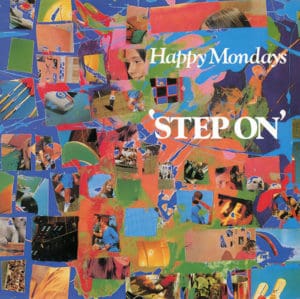
High Water Mark
But the definitive record was the Happy Mondays’ third album. Released in November that year, Pills ‘N’ Thrills And Bellyaches was not only the high water mark for the Happy Mondays, it was the high water mark of the Madchester phenomenon. An infectiously danceable and eclectic melting pot, it spawned two of the movement’s defining singles: Kinky Afro and Step On.
1989’s majestic The Stone Roses has become one of those timeless untouchables; beyond criticism and wholly worthy of its classic status. But, at the risk of being pilloried, Pills ‘N’ Thrills fully captures the hedonism, humour and anarchic eclecticism of Madchester in a way that The Stone Roses could never hope to. Pills ‘N’ Thrills is not a record that wants to stand on a pedestal – it’s more likely to trip up over the pedestal on the way the bar, with a slightly bemused look on its face.
Everything about it is iconoclastic. It’s a record that proved you could make a huge artistic statement without being po-faced. Laced through with that idiosyncratic, surrealist humour, the opening couplet sets the bar: “Son, I’m 30. I only went with your mother ‘cos she’s dirty!” Even the LP’s ridiculous title and garish artwork (by the Ryders’ cousins at Central Station Design) reinforce that ambivalence towards traditional expectations of ‘classic’ status.
The Unlikely Lads
The most perplexing thing about the Happy Mondays’ third album is quite how they ever made it to that point in the first place. To say that their reputation preceded them would be something of an understatement. Accusations of being permanently off their heads, difficult to produce, impossible to manage and unlikely to turn up for promotional duties were not entirely without foundation.
The band’s reported drug taking, parodied in the 2002 film 24 Hour Party People, has become legendary. The reckless abandon of the Haçienda scene, and the role they played in it, presented a direct affront on conservative sensibilities; a threat to morality of the nation’s youth. That said, contemporary interviews reveal a surprisingly fresh-faced looking Shaun Ryder and Bez, awkwardly fielding questions about their bad boy reputations with angelic smiles and feigned innocence.
Speaking from distance in the early 2000s (for a 24 Hour Party People interview), Shaun said: “Basically, we turned arsing about into an artform.” Citing timekeeping as just one example, Ryder continued: “We were bad at everything a band’s supposed to be good at… We were good at being ourselves… which was just fucking about.”

Winning Formula
Inevitably, all the tabloid-baiting shenanigans (largely stemming from Shaun and Bez) tend to obscure how wonderful, intricate and accomplished the music is. They weren’t all just wreckheads, aimlessly chasing hedonism as the total end. The boys could actually play. At this stage, at least, they held it together (just) enough to deliver the goods.
Their secret weapon was the production duo, Steve Osborne and original superstar DJ, Paul Oakenfold. They first teamed up on several club remixes, notably reworking the hit Wrote For Luck (renamed W.F.L.) from the previous album, Bummed. Pleased with the results, they hooked up again for a cover of John Kongos’ Step On, and the winning formula set the template for the sound and approach they would follow on the next album.
The defining record of the Madchester movement was in fact produced in sunny Los Angeles (with additional tracking at Eden in Chiswick, London). Whilst on tour Stateside, the Mondays took advantage of their rising profile with Elektra Records to bag studio time in the iconic Capitol Tower where countless US heavyweights, from Frank Sinatra to The Beach Boys, had recorded.
According to music tech mag Sound On Sound, the recording sessions were actually quite structured and organised. Rather than recording a song traditionally, then later producing a remix, the producers blurred the boundaries. The remix methodology of adding samples, loops and electro flourishes was instead incorporated into the original fabric of the song, during its creation. While common practice today, that’s largely thanks to records like Pills ‘N’ Thrills for breaking new ground.
Madchester Movement
The rhythm section – Gary Whelan on drums and Paul Ryder on bass – would record together to lock in the grooves. They developed a technique of looping a section of a groove laid down by Whelan, which he would then embellish with additional flourishes recorded over the top. Instrumental parts were indeed played by the members, but then henceforth often approached as samples, with song structures assembled and shaped in the edit. This gives the record the characteristic feel of being, at once, a loop-based electronic dance record, and yet simultaneously, an organic, living, breathing performance.
Guitarist Mark Day has never attained the adulation reserved for John Squire, but he’s a tour de force, responsible for some innovative and abrasive licks, integral to the Mondays’ sound. His injection of grit is the perfect counterpoint to the baggy, psychedelic grooves, and a pivotal element of the record.
As with the Mondays’ earlier work, influences are drawn from far and wide: the jangle pop of England’s North West, from The Beatles to The Smiths; a healthy smattering of Northern Soul; Delta blues. Then more contemporary influences from further afield: Chicago house, Balearic beats, and Italo house (surfacing in those bouncy major key piano chords).
But all this eclecticism had to be channelled effectively. Oakenfold and Osborne were central in tying it all together seamlessly, curating the melee of sounds and ideas into something coherent. Drawing upon their experience as club DJs, each track is a journey that progresses to a euphoric climax.
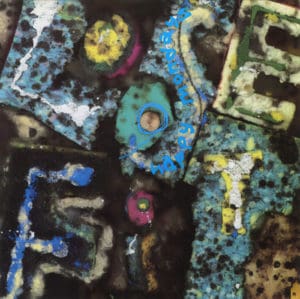
The Bard Of Baggy
If it sometimes seems the Mondays were just making it up on the spot, that’s because half the time they were. Shaun’s ad-libbing has formed its own mythology: a transcendent, stream-of-unconsciousness flow of surrealist street talk, full of private in-jokes and slang. Asking him for a second take to refine a vocal line would be pointless, likely resulting in something else altogether. But even when he’s winging it, he’s tapping into something magical, like a shaman channelling a higher power.
Shaun Ryder is essentially an early prototype of ChatGPT, absorbing snippets of data from the world around him (movie lines, radio jingles, pub banter) then regurgitating it into a form that almost makes sense, though produces bafflingly hilarious results. Following Oscar Wilde’s assertion that “talent borrows, genius steals”, Ryder is the lovechild of Albert Einstein and the Artful Dodger. On Pills ‘N’ Thrills, he pilfered lyrical and melodic phrases liberally, lifting pop culture tidbits from anywhere and everywhere. Indeed, even his iconic melon-twisting catchphrase was actually filched from a Steve McQueen line. But finders keepers, and Ryder owns it entirely.
Pills ‘N’ Thrills took the Mondays to dizzying new heights. But from this towering position, the only possible route was downhill on a steep decline. Ultimately, the party had to come to an end. By the time of recording 1992’s follow-up Yes Please! in Barbados, the hedonism really had spiralled out of control.
Huge Influence
But the fixation on any debauchery obscures the greater truth that – in amongst the chaos – the Mondays produced something really quite innovative: deceptively funky basslines, beats looser than their bell-bottoms, ballsy and inventive guitar work and post-punk vocals. Factory boss Tony Wilson acknowledged the Mondays’ musicality, singling out the rhythm section for taking Chicago house and translating it into a new, distinctly British genre.
While the Happy Mondays wore their influences outwardly, you can clearly hear their impact on numerous bands that followed. Pills ‘N’ Thrills laid the template for the ensuing decade of Britpop and undoubtedly influenced both Oasis and Blur. Not coincidentally, Gorillaz scored their only UK No.1 single with a certain Mr Ryder on guest vocals and the brilliant Dare in 2005.
Primal Scream’s Screamadelica saw them work with DJs to reassemble their indie rock for the dancefloor. The emerging trip-hop of acts like Massive Attack and Tricky took something from them, too. Meanwhile, the baggy beats and oikish vocal delivery of Kasabian’s first record owe everything to the Mondays. Quite how much the band were revered was clear in the outpouring of tributes after the untimely death of Paul Ryder in 2022.
They are often presented as the class clowns. And comedies never win big at the Oscars, despite the craft involved. But the Mondays were always more than a bunch of chancers who got lucky. They stumbled onto something quite magical of their own making. The ever hyperbolic Tony Wilson proclaimed that Pills ‘N’ Thrills would be “one of the great British albums of the age”. He wasn’t wrong.
The Tracks
KINKY AFRO
A blissed-out opening, with silky strings that instantly evoke a throwback Northern Soul 45, before those trademark baggy beats kick in, and swiftly pull it in another direction. From here, it revolves around a rudimentary two-chord riff. As with much of the Mondays, it’s a solid framework on which to hang other embellishments. From Shaun Ryder’s cracking opening line onwards, it’s just sheer fun. Light fingers at the ready, Ryder commandeers a catchphrase from the movie Die Hard, and sets it to the hook of Lady Marmalade – a move so brazen only he could get away with. Some stellar guitar work from Mark Day pre-empts the rock and roll swagger of Oasis on Definitely Maybe, though the groovy bassline from Paul Ryder is not something you’d expect of the Gallaghers. The second single, it was a No.1 hit on the US Billboard Alternative Airplay chart, and a UK Top 5.
GOD’S COP
Opening with a screaming guitar sound, God’s Cop demonstrates that the ravers could rock hard, too. Then in comes that loose, baggy beat and it’s back to Madchester. It swirls along on a psychedelic groove, a catchy synth-strings hook, and pulsing drums, painted over with the swirling guitar. The groove was apparently built up over a revolving loop from hip-hop pioneers De La Soul’s Me Myself And I. Lyrically, it references James Anderton, a real-life Manchester police chief, former preacher and “deeply-polarising” figure, who in 1987 made a controversial claim to be carrying out God’s work.
DONOVAN
Evidence of the Madchester scene’s nostalgic affinity with the 1960s troubadours. The Mondays had a curiously alluring bond with future father-in-law, Donovan. They’d been absorbing his back catalogue while touring, even inviting him to the Haçienda (“I thought it was a Mexican restaurant!” he later told The Guardian), and the influence seeped into the songs. Musically, the track borrows from Donovan’s hit Sunshine Superman, and has an exotic folky flavour, while also taking cues from Mad Cyril off the band’s previous record. Donovan would go on to be the support act on the Mondays’ 1990 arena tour, while the Ryder brothers would pair up with his daughters (Shaun has a daughter, Coco, with Oriole).
GRANDBAG’S FUNERAL
A raucous funk workout with punk energy, not a millions away from Gang Of Four. Paul’s bassline leaves oodles of space between the grooves for the swirling Hammond organ. Meanwhile, Day’s trashy guitar part again highlights just how inventive his contributions were. “Bring all the family out to the funeral” bellows Shaun, full throttle and rasping, in one of his most vocal-shredding performances. “Skin up, lady! Lady, skin up!” A different flavour and pace for the album.
LOOSE FIT
The 12″ version begins with the distinctive sound of a Zippo lighter sparking up, followed by a big intake of the lungs. An appropriate introduction for this stoned-out delight. With an uncharacteristically moody and atmospheric vibe, Loose Fit feels more aligned with the burgeoning trip-hop sound of Bristol than the upbeat Madchester vibes displayed elsewhere. Built around a shimmering chorus-laden guitar riff that owes something to The Cure, it skulks along with menace. Though not typically regarded an overtly political band, the single version edited out Ryder’s withering commentary on the Gulf War (“Gonna buy an air force base / gonna wipe out your race”), to avoid the wrath of the BBC.
DENNIS AND LOIS
The title references some new friends the Mondays made in New York City, while on tour. Musically, the inspiration was apparently Stevie Wonder’s Superstition, though the resulting vibe is more immediately reminiscent of an old Northern Soul classic, especially with that bassline from Paul.
BOB’S YER UNCLE
An attempted cover of Everybody’s Talkin’ ultimately morphed into this original song. Conceived as a dirty talk track, Shaun Ryder’s deep, whispered vocals bring a decidedly sinister feel. Rowetta’s steamy backing vocals fit the bill; but with Ryder’s potty mouth, it’s not just suggestive; it’s outright filth. He may be reaching for Serge Gainsbourg-level suave, but it’s more creepy than sexy. The acoustic guitar has a flamenco feel, while the jazzy flute and sax samples add to the groovy, almost Latin flavour.
STEP ON
Those iconic opening bars – featuring choppy keyboards triads, followed by that guitar riff – are the sound of Madchester in a nutshell. The John Kongos original (He’s Gonna Step On You Again) is a thing of beauty in itself; but the Mondays deserve full credit for their now definitive version. Originally commissioned as a low-stakes cover for a compilation celebrating the artists of Elektra Records, it grew into something quite special and unique. It ended up so darn good that they kept it back for themselves, offering up an alternative Kongos cover instead. Ryder is at his most melodic, purring and cooing seductively, while the big gospel vocals from Rowetta (her first outing with the band) provide the cream on top. It’s chaotic, hurtling along on that jangly riff, as if it might come off the rails at any given moment.
HOLIDAY
Another example showcasing the fine guitar work from Mark Day. There are echoes of the Johnny Marr sound, but chorus-laden and funkier. Rowetta provides some soulful vocals, while Shaun delivers his trademark sprechgesang (“I smell dope” being one of the key insights offered). A solid album track, but in terms of hooks it’s not the greatest highlight. Holiday is tucked away at the back of the record to pad it out for a reason.
HARMONY
A blissed out conclusion to end on, with whispers of Sweet Jane by The Velvet Underground. The perfect comedown for the end of the party, enhanced by some squealing guitar and whirling Hammond organ. According to the original masterplan (or perhaps a fleeting whim), this was supposed to be the ‘Ringo’ moment, when the drummer takes centre stage on lead vocals. For whatever reason, it didn’t happen, but that’s probably a good thing, because instead we’re treated to another inspired song-lifting by Shaun, this time of I’d Like To Teach The World To Sing… not quite in perfect harmony. But a perfect cacophony, nonetheless.
For more on Happy Mondays click here
Read More: Check out our Happy Mondays interview



